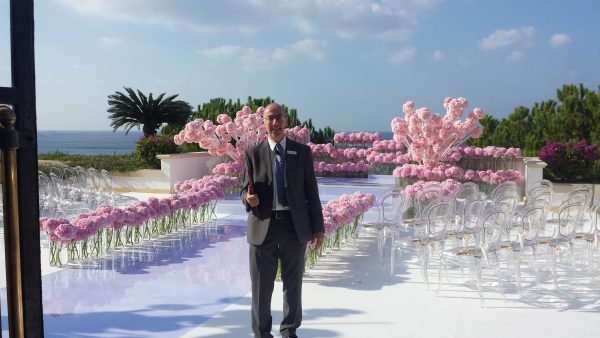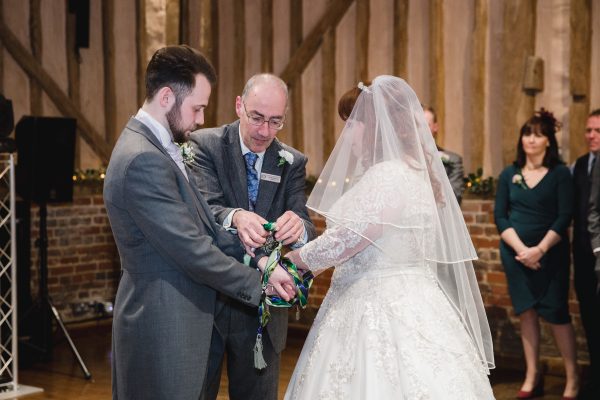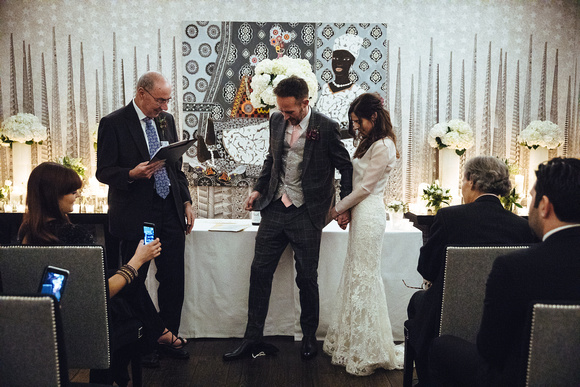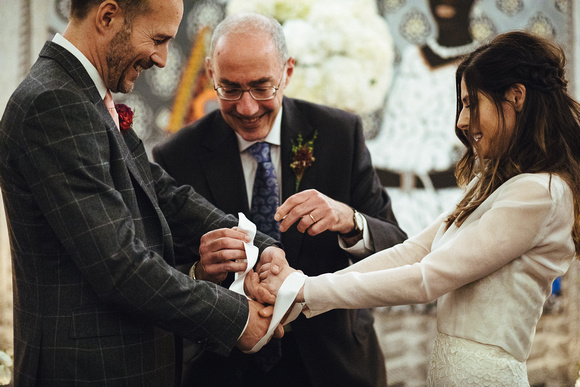
by Michael | Mar 27, 2018 | Blog
What do you think about child-free weddings?
Wow! I bet there are some polarised responses to that question!
Child-free weddings will certainly be a matter of opinion. As a celebrant, I’ve had good and bad experiences where children have been concerned. Without getting implicated in controversy, let me make a few observations.
Young children do have the potential to turn solemn moments into a nightmare. Even entire ceremonies. Parents suffer, of course, but so do those around them. With the best will in the world, children ‘s behaviour cannot be taken for granted, whether or not they are ‘on show’.
Naturally, the age of the child will enter into the equation, but here are some tips to make it easier for child, parent and other guests.
Toddlers
It’s good if your child can maintain his natural rhythms. If he likes to sleep at a certain time, make it as easy as possible for him to sleep then, even if it means you have to miss some of the post-ceremony socialising and feasting. If you’re lucky, there may be a quiet room you’ll be able to use.
Formal clothes may be uncomfortable for the child, and she may make that discomfort obvious!
You don’t have to take on the whole burden yourself. Your partner can share in the duties! Or you might rope in relatives or close friends. If a parent is participating in the ceremony, then it’s essential that someone close to the child or baby looks after her. It’s also reassuring for the child to be surrounded (in a crowd) by familiar faces, so have such people seated close by.
It’s probably best to take your child out of the main event, if he is showing signs of strain or fatigue.
Don’t expect to be able to stay till the wee hours. Your child will almost certainly have other ideas!
Youngsters
If the child is older, you may be able to prepare him beforehand. Bribery is permissible! Tempt him with the prospect of a good buffet, if he’s good. Consider offering a book, some paper and crayons or even (muted!) a hand-held electronic device.
Few people will complain if your little one is playing quietly with some toys.
If you are relaxed, you are more likely to find that your child relaxes too, and the dreaded tantrum can be averted.
You may be able to get your child to be a flower-girl or an usher. Explain the role clearly and stress what a privilege she has been given!
With a bit of preparation and thought, the ceremony need not be a nightmare at all. A lot of people will be supportive and understanding, if there are minor lapses. Most will be appreciative of good behaviour and will even express this (which will reinforce your child’s desire to earn praise next time).
It’s not a minefield. Of course, you may prefer not to bring your child – or not to come at all. But, I hope you can see that the risks can be reduced, and the event may pass far more pleasantly than you imagine!

by Michael | Mar 19, 2018 | Blog
A foreign wedding can be exciting and so different! Your surroundings are likely to be beautiful and even exotic. You can probably look forward to better weather than the UK will provide. The atmosphere will be a holiday one, and that can add to the occasion. People will have a chance to get together before the wedding in a relaxed way, and get to know each other.
What’s not to like?!
A foreign wedding may make one set of family and friends very happy. It means that your honeymoon starts even before the wedding!
On the debit side, cost, travel and accommodation arrangements for yourself are likely to be an issue. Even more so if you are looking after your guests’ arrangements.
And which guests do you invite, anyway?
Language may be an element that works against you, especially if the wedding co-ordinator does not speak good English. Making arrangements at a distance can be difficult anyway.
Who are you paying for? Is it just yourselves? Perhaps it’s you and your close families? Maybe you’re paying for your guests’ accommodation? And meals?
Are you going to arrange a subsequent ceremony, like a wedding blessing, for those left behind in this country?
There’s a lot to consider, so planning a foreign wedding is not a step to be taken lightly, appealing as it may well be.
Travel
You’ll have to decide how long before the wedding you arrive at your destination. Allow time to recover from the journey, and long enough to sort things out with the wedding co-ordinator (if you have one). You may also want to arrange a rehearsal.
Hotel
You need to make contact with the co-ordinator at an early date. Have a look at the ceremony space, and then the reception area. Do (or will) they have everything you need and asked for? Can you arrange a rehearsal (if required)?
Check that all suppliers are confirmed (celebrant, catering, photographer, make-up, florist etc.).
You may be in charge of your guests’ arrangements. How will they get from the airport or station to the hotel? Are the rooms booked? And meals?
Every wedding will be different. Nonetheless, I hope this will be useful as a starting-point before you decide whether a foreign wedding really is for you.

by Michael | Mar 12, 2018 | Blog
Wedding day stress is to be expected. Of course, it is. However much you may have prepared, you don’t know what might actually happen … Even if you’re using a wedding planner, you can’t quite be sure.
All you can do, when all is said and done, is to ensure you have prepared carefully. Have you covered most eventualities? If you have, the chances are that everything will go smoothly, and there’s no point you getting uptight.
If something does go wrong, there are people who will bust a gut to sort it out for you.
There’s certainly no point upsetting yourself (and others!) by worrying. It is supposed to be your big day, and you do want to enjoy it. Don’t let what might not even happen spoil it.
Be ready on the day
Assuming you have booked and confirmed your suppliers, there are only a limited number of jobs that need to be done on the day. Let’s assume the bride’s hair, nails, make-up and dressing are under control!
Bride
Final assumption: you will have done a rehearsal (or talked it through) and you (and your retinue) know what you have to do when you process in at the beginning of the ceremony.
Give your Maid of Honour a small emergency kit (needle and thread, paracetomol, cough sweet etc.) to look after.
If you are not staying at the venue, ensure you leave plenty of time to get there (even if you plan to arrive late!). (More on this subject presently.)
Groom
Apart from looking elegant, your sole duty, probably, is to bring the rings and hand them to your Best Man.
You need to arrive early – mainly to ensure (probably, in collaboration with your civil celebrant) that everything is ready for the ceremony, and (with the groom) for the reception.
I had booked a taxi a week before my wedding and reconfirmed the night before. It still never showed up, and I had to book another one with immediate effect. Because I had booked the original minicab for a rather ridiculous hour, it wasn’t an issue. However, that was stress I could have done without!
Best Man/Maid of Honour
Both need to arrive punctually for their respective functions.
The Maid of Honour normally has to reassure and organise the bride.
The Best Man may have the rings already, or may have to remember to get them! Once at the venue, he needs to check in with the venue’s wedding planner (if there is one). The groom may well be early too, and may need a smile and an arm round his shoulder. Of course, the groom may ask you for certain errands. Do them with good grace.
The civil celebrant (if used) should be arriving very early too, so he/she will check that everything is in place for the ceremony. You may be kept in the loop, or not. Likewise, with the reception arrangements.
Stress-free!
So the key to a successful ceremony is preparation, first of all. Then it’s usually a case of responding calmly and positively to a mishap.
Odds on, the mishap is not a disaster (although, I admit, one ceremony I conducted was rather interfered with by a [small] fire!). People rally round, and most of your guests accept that things do happen beyond our control.
So what seems awful to you, may be a passing inconvenience to your guests.
The good news is that the majority of mishaps are not even noticed. And actually, a mishap is the exception, certainly not the rule.
So, what are you worrying about?!
For more advice or suggestions, contact Michael.

by Michael | Mar 8, 2018 | Blog
Where do you begin, when planning your wedding?
If nothing else, consider these points:
- The budget
Obviously, this is the bottom line. You need to work together with anyone who is helping you here (probably your family?), and decide rationally what you will spend. It’s no good getting carried away with enthusiasm – you need self-discipline.
Big as the occasion may be, you do not want to bankrupt yourselves. And it’s worth pointing out that the amount spent does not guarantee the success of the marriage itself!
The event is (or should be) a ceremony; it should not be an attempt to show off how rich or extravagant you are. Should the reception mean more than the vows?
Good taste and sincerity are more important.
This doesn’t mean that you can’t have a few OTT touches (budget permitting), but these should be a bonus rather than what you are aiming at. There are probably certain elements that you will insist on, and it’s as well to discuss these at the outset, so that they aren’t overlooked later.
The budget will also dictate the ceremony, participants, reception and number of guests to invite, but that is something I cover elsewhere, notably in my book “Your Wedding Guide”.
- Date & location
Naturally, it will be more expensive to schedule your wedding at peak times (such as summer holidays, Christmas or around Valentine’s Day). You may want to avoid major events, such as World Cups and holiday season, when your potential guests may be otherwise engaged.
You’ll need to consider climate too, if you want an outdoor wedding. Or, at least, a Plan B.
The venue should, of course, be where you want it to be, but if it’s in an exotic location, your guests may have to go to a lot of expense and trouble to attend, so keep that in mind.
Make sure you visit the venue, ask questions and ensure that you really want to have your ceremony there.
- Other Suppliers
As soon as you have settled on your budget, start choosing other suppliers that you may need. Like the venue, which may want a year or more advance warning, you should allow plenty of time, in order to secure the supplier of your choice.
Among others, you will need to consider florists, caterers, musicians and, not least, celebrant. Where possible, you should meet with these first, so you can feel confident you have made the right choices. All that takes time, so allow for that.
- Choosing theme and colours
It’s easy to get excited and let your imagination run away with your wallet. Keep your budget in mind, use wedding books and planning guides and whatever resources are available to you.
Do not over-decorate. Make full use of flowers and candles.
Be creative with the colours. These may reflect the bride’s personality. Vivid colours (tastefully combined) can be most effective.
- Vows and music
The vows are one of the most important elements of a marriage. They should be well-planned – and audible. They are a public declaration of your mutual feelings, and should not be under-valued.
Equally, the music should be planned carefully and be clearly audible. Make sure you choose lyrics that you want your guests to hear!
Hopefully, the planning will be a team effort (maybe even the groom will be willing to participate!). If approached in the right way, it can be enjoyable and exciting, and the result will be so worthwhile.
For further advice, please contact Michael.

by Michael | Mar 7, 2018 | Blog
If you’re looking for a personalised wedding ceremony, you might like to include a ritual. It can make such a difference.
“Ritual” may possibly sound a bit too religious for some, but it could be something as simple as both drinking from a Loving Cup, or presenting parents with a red rose.
You may never have considered a handfasting ceremony. Actually, you may not have heard of one, either!
Assuming that you are basically unfamiliar with a handfasting, here is a bit of information that may clarify things.
Example of a handfasting

Photo: louiedonovanphotography.co.uk
Briefly, and simply: the couple take each other’s hands – left in left, and so on. The celebrant ties their wrists together and says suitable, beautiful words. After a while, the hands are untied.
In its simplest form, that is a handfasting.
Incidentally, this ritual is the origin of the expression “tying the knot” and indeed “bonds of holy matrimony”.
Origins
The ceremony probably originated in Celtic times; however, it flourished in Europe until the mid 1700s. Up till then, few unions were sanctified in a religious building like a church. Rather, they were celebrated by a simple handfasting ceremony in which the two partners joined hands over the village anvil, in the fields or in the groves of trees. Today, we build upon this tradition.
The basics
The couple link and cross hands (normally right hand to right, and left to left) to form an infinity circle. Then, with a cord or ribbon (or ribbons), the wrists are symbolically tied and knotted, in a lovers’ knot.
The cords are then removed with the knots still in place. The couple will take the cord away with them and, ideally, it will be a permanent reminder of their vows.
Where does this happen?
Again, it depends, but many people prefer a quiet, open-air historic site that may be considered to be spiritual and preferably pagan – such as standing stones.
What about Stonehenge?
A civil celebrant, such as myself, can conduct a handfasting wedding or vow renewal in the Inner Circle at Stonehenge (normally around dawn or dusk), but this needs to be booked months in advance. However, places like Avebury, Old Sarum or the Rollright Stones might be more practical.
A handfasting can comprise an entire ceremony in itself, but is often one element among many.
Breaking the Glass

Photo: www.lyndseygoddard.com
Originally Jewish, this ritual is growing in popularity. There are many explanations for this. For example: it can recall the destruction of the Jerusalem Temple; serve as a symbolic reminder that things do break; and I have even heard that it is meant to be the last destructive thing to happen in the marriage.
Come what may, everybody enjoys shouting “Mazal tov!” when the deed is done!
Your civil celebrant will be able to help you learn more about rituals. Why not take advantage?

by Michael | Mar 6, 2018 | Blog
Most people assume that a wedding is either a religious affair (which involves following the regular marriage service liturgy) or a register office ceremony (following a standard non-religious script). Both are standardised and scarcely, if at all, personalised.
By the way, I have nothing at all against religious weddings. That’s how my wife and I married, and it was exactly what we wanted.
Register office ceremonies may be all that certain people want, and I’m fine with that.
Another option
But what if religion isn’t really your thing? What if you’re ‘marrying out’ and your church won’t let you have a full service? What if you don’t want the formulaic ceremony of the register office, but want something bespoke?
Then, of course, the civil celebrant can offer you something special that can tick all your boxes.
But it isn’t legal, is it?
According to current legislation, every wedding needs to be legally registered (which is where a registrar comes in).
If you want a personalised ceremony, this needn’t be a problem. Just go down to the register office (at a pre-arranged time) with two witnesses, get legally married and then have the wedding ceremony that YOU want in front of your guests at a place YOU choose.
If you’re marrying in a licensed venue, you can be a little creative – why not have the registrar’s part done first (even in a different room!) before enjoying the festive part in front of all your guests, relaxed and joyous?
So what’s “personalised” about it?
By definition, no two personalised weddings will be the same! However, this is how the finished product may be arrived at.
After an initial chat of maybe an hour, the civil celebrant will have given you a few ideas, explored your wishes and learnt a bit about you and your story.

“Breaking the Glass” ritual
Depending on what you choose, you can include readings that reflect your personal beliefs (prayers, poems, prose) and control who reads and who participates. Any procession and/or recessional, music, rituals – all can be chosen by you to make a memorable and meaningful ceremony for YOU – and your guests.
Your wedding is probably the biggest, most significant day of your life, so surely it makes sense for you to be able to choose how, where and with whom you celebrate it!
Ask Michael for more information.
Photos courtesy of www.lyndseygoddard.com






